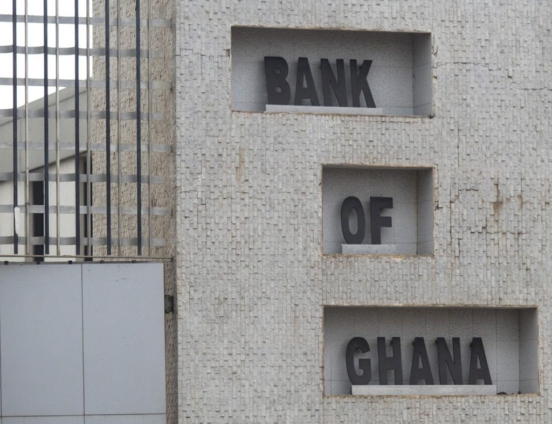A report chronicling various charges on products and services offered by banks in the country has presented a mixed picture of ATM charges by the banks.
The report – Survey of Bank Charges, Fourth Quarter 2019, conducted by the Financial Stability Department of the Bank of Ghana covers the 23 banks operating in the country.
The report covers charges from current accounts, savings accounts, cheque book charges including what is paid by customers as fees on various charges when it comes to taking a loan.
Charges on ATM are split into 3; charges on issuing, charges on cash withdrawal at a bank's own ATM and ATM card maintenance per month.
From the report, in issuing an ATM card, some Banks go as high as GHC 50 in issuing an ATM card, some also issue based on whether your account is a current account or savings account while some also issue based on the type of card you want with each having different withdrawal limits and other features.
Currently, if a bank should issue an ATM card, you should be prepared to pay between GHC 0 and the highest being GHC 50.
If you were withdrawing your cash at the ATM you would imagine it will be for free right?
According to the data, Prudential Bank will charge GH¢ 0.25- GH¢0.40 on cash withdrawal at the Bank's ATM, NIB goes up to GH¢0.50 with Zenith Bank charging GH¢1 for VISA and MASTER CARDS and GHC 0.18 for PROPRIETARY CARDS.
In maintaining an ATM card, be prepared to pay GH¢ 2.5 per month with CAL Bank and as high GH¢15 per month for STANDARD CHARTERED, GH¢15-20 a quarter for STANBIC Bank.
Minimum balance
Another interesting feature of the report is the figures on minimum operating balance banks ensure customers maintain. On average, if a customer wants to maintain a fully function savings account, he or she may need between GHC 0 which is the lowest and as high as GH¢100.
A minimum operating balance is what must be left in the account regardless of what you may withdraw. You cannot draw down on your account exceeding that amount.
So if your minimum operating balance is GH¢30 such as ECOBANK'S which is contained in the report and you deposit GH¢500, your balance may read GH¢ 530 but you cannot withdraw all of it. You must leave the GH¢30. It cannot be withdrawn.
For an initial deposit, it varies, depending on if it’s a savings account or a current account. For an initial deposit on a current account, a customer should be prepaid to open an account with between GH¢ 0 and GH¢ 100 for an individual account, you will pay between GH¢ 0 and GH¢ 1000 and for corporates, and SMEs, between GHC 0 and GH¢4000.
On the other side, if you would want a loan from the 23 banks captured in the report then be prepared to pay some charges. Banks charge fees on loan arrangements as a way to cover their costs of putting the loan together.
According to the Bank of Ghana, there are about 5 different types of fees charged by the 23 banks captured in the report. These are commitment fee, processing/establishment fee, arrangement fee, and insurance fee.
The rates charged may differ based on if an individual which is categorized as RETAIL is borrowing or a company which is categorized as CORPORATE.
For example, a bank may charge between 0.25% and 2% of the total loan amount as a commitment fee. Commitment Fee is charged and used to compensate the lender.
This is charged so that just in case you do not want to use the loan again, the bank or lender is compensated for actually getting ready and planning to set funds aside to lend to you.
For some banks, the cost will not change if you are a retail customer or corporate customer but others factor this into the commitment fee. You may pay more if you are corporate and less if you are a retail customer.
Another significant fee is the Insurance fee on your loan. Banks will typically charge between 0.00% - 2.25% of the loan amount. This rate may be negotiable depending on the type of loans and may be paid upfront depending on the bank in question.
The charges are varied and are not cast in stone. The Bank of Ghana is doing so to keep the public informed and abreast with the happenings in the banking sector.
Latest Stories
-
Moffy drops new single ‘Wo’, blending culture and modernity
3 mins -
Don’t bring soldiers to polling stations – Martin Kpebu
15 mins -
Ogyeahohuo Yaw Gyebi II retained as President of National House of Chiefs
30 mins -
Embrace ICT to fit in digital world – Ho NYA boss to youth
1 hour -
We don’t want armed soldiers at polling stations – Tanko-Computer
1 hour -
Drama as police corner armed robbers inside locked forex bureau at Lapaz
1 hour -
Nigerian-born conquers childhood hearing loss to become KNUST’s overall best graduating student
2 hours -
ECOWAS Court orders compensation for violations against New Force’s Shalimar Abbiusi
2 hours -
Dreams FC denies allegations of attempting to sign Najeeb Yakubu
3 hours -
Election 2024: ‘Right to free and fair elections non-negotiable’ – Akufo-Addo
3 hours -
Kurt Okraku took out my passport from the U23 squad that travelled to Japan – Najeeb Yakubu alleges
3 hours -
Where hope fails: Ghana’s decaying home for the destitute
4 hours -
NDC Mining Committee for 2024 campaign refutes allegations of recruiting thugs for elections
4 hours -
Traction Control: A lifesaver with an off switch? Here’s why it exists
4 hours -
I don’t need anyman to woo me with money – Miss Malaika 2024 winner refutes pimping claims
4 hours

